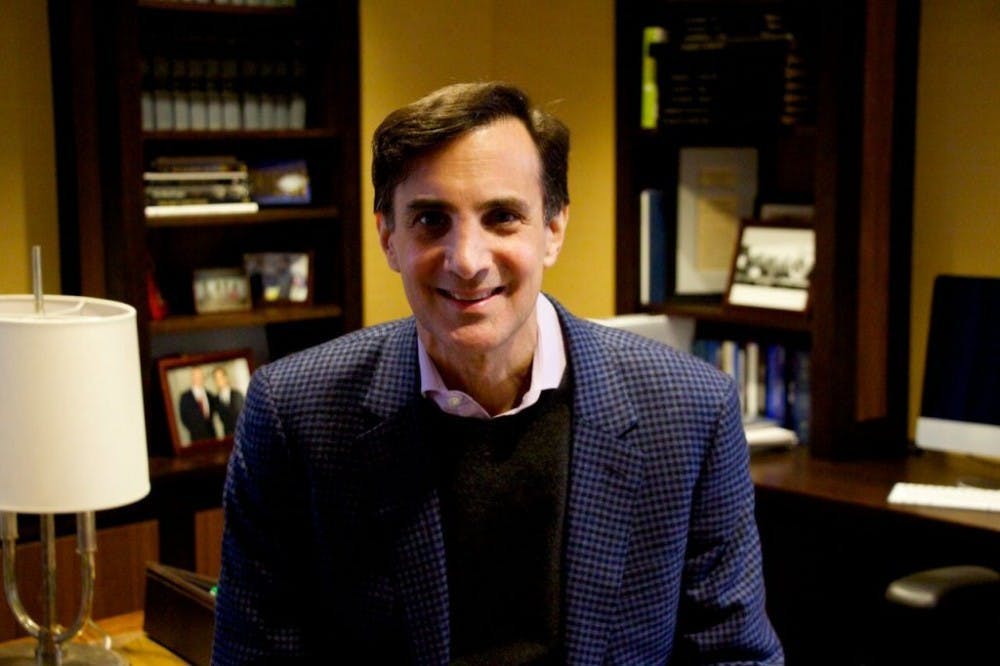Lou Forster, the chair of the University’s Board of Trustees, announced a five-year extension of University President Ronald J. Daniels’ term in an email to University affiliates on Monday. This extension, which lasts until 2029, will make Daniels the second longest-serving president in the University’s history at the end of his term.
In an email to The News-Letter, Vice President for Communications Andrew A. Green explained how this decision was made.
“The University’s protocol for reappointments includes a 360-type of review, which involves discussion and input from a range of stakeholders from across both [the] University and [the School of] Medicine,” he wrote.
According to Green, the decision was made based on Daniels’ contributions to the institution, his goals moving forward and his leadership strategy.
Forster expressed optimism over the University’s trajectory under Daniels’ leadership in the email. He highlighted Daniels’ pursuit of several critical goals for the University, including meeting student accessibility needs, strengthening the University’s collaborative environment and fostering community engagement.
“There is little doubt that in these priorities, the University has made great strides forward over the past decade,” Forster wrote.
Forster noted that, supported by Michael Bloomberg’s headline $1.8 billion gift, Daniels has overseen the expansion of diversity and inclusion initiatives for students; last month, the University announced the creation of the Vivien Thomas Scholars Initiative, a $150 million program dedicated to increasing diversity in STEM PhD programs. This year, the U.S. News and World Report ranked the University in the top ten for campus ethnic diversity.
During Daniels’ tenure, the University also created interdisciplinary efforts such as the Bloomberg American Health Initiative, the Stavros Niarchos Foundation Agora Institute, the Henry A. Kissinger Center for Global Affairs and the Ralph S. O’Connor Sustainable Energy Institute. According to Forster, cross-divisional faculty research has been bolstered by the Bloomberg Distinguished Professors program, through which 50 faculty members have received joint appointments to different schools in the University.
Forster also noted Daniels’ devotion to strengthening the University’s relationship with its community. He emphasized that Daniels has also championed HopkinsLocal, a program launched in 2015 to support investment in real estate construction and local businesses and to increase employment of Baltimore residents.
Despite support from the Board of Trustees, students and faculty have expressed concerns over the renewal of Daniels’ contract.
Junior Adelle Thompson disagrees with the decision to extend Daniels’ term.
“Hopkins needs a culture change, and that’s never going to happen when you have the same people in charge for decades,” she said in an interview with The News-Letter.
In the spring of 2019, students and community members held a month-long sit-in at Garland Hall to protest the University’s push for a private police force. Escalation from the protest resulted in the arrest of seven people, including two undergraduate and two graduate students.
In an interview with The News-Letter, François Furstenberg, a professor in the History Department, called the incident an avoidable misstep and questioned the University’s support for the police force despite internal and external opposition.
“There’s been huge amounts of political capital spent to push [a private police force] forward, and so far the result is that we still don’t have a police department,” he said. “My sense is that it probably won’t happen. This is a singularly bad time to create an armed police force just in terms of the politics of the moment.”
Green responded to concerns regarding the private police force, underscoring the University’s commitment to finding new ways to address public safety concerns.
“While we have paused implementation of the JHPD so that we might benefit from the reforms that are emerging locally and nationally, we remain committed to exploring non-police approaches to public safety to help address crime in our community,” he wrote. “Examples include the $6 million, [four]-year JHU Innovation Fund for Community Safety and our planned launch this fall of the Behavioral Health Crisis Support Team.”
Furstenberg also criticized Daniels for relying too heavily on the Board of Trustees and senior leadership without seeking adequate feedback from students, faculty and community members. Furstenberg claimed that this has caused a disconnect between leadership and the rest of the University.
As a member of the Homewood Academic Council, Furstenberg questioned the rigor of the approval process undertaken to extend Daniels’ appointment.
“The process for promoting an assistant professor at Hopkins involves far more careful independent vetting and verification than appears to be undertaken by the [U]niversity’s Board of Trustees in deciding on the reappointment of our university’s president,” he wrote.

















